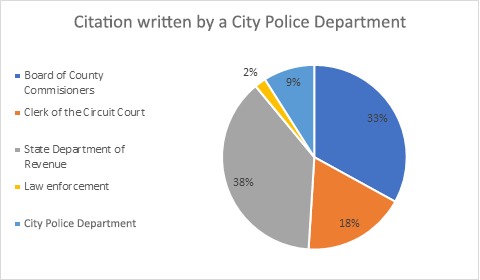In every legal process and system, efficient operation relies on the distribution of revenues, and Collier County is no exception. Whether it’s paying a filing fee for a civil case or settling fines for traffic violations, understanding the uses of your money helps to understand the charges. Our office shoulders a significant portion of the workload in processing citations and case files but doesn’t always receive an adequate share of the fees collected to support our role. In this article, we will navigate through the maze of current funds distribution. We’ll show the destination of the funds and provide some examples of how these funds are used.
When we think about the fines collected from traffic citations, it’s easy to assume that law enforcement agencies receive all or most of the revenue. The allocation of funds from traffic citations is more complex and diverse than this. Let’s look at the distribution of the civil penalty paid for a seat belt violation.
The penalty for a seat belt violation is $113.00. Below is a list of how that penalty is disbursed:
The law enforcement agency, who wrote the citation, gets $2.00 for law enforcement education.
The Board of County Commissioners gets $37.50.
- $30.00 for court facilities
- $2.50 for criminal justice education programs
- $5.00 for driver education safety
The Clerk of the Circuit Court and Comptroller’s Office gets $30.38 if the citation was written by the Collier County Sheriff’s Office
- $27.38 for the Clerk’s budget
- $3.00 for court technology

The Clerk of the Circuit Court and Comptroller’s Office gets $20.22 if the citation was written by a city police department such as Naples Police Department
- $17.12 for the Clerk’s budget
- $3.00 for court technology
The City Police Department gets $10.16 for their budget.
The State Department of Revenue gets the majority of the collected funds at $43.12.
- $18.62 for the state budget
- $4.02 for additional court costs. Of these funds, 92% goes to the Department of Law Enforcement for training, six and three-tenths percent goes to the Department of Law Enforcement for criminal justice grants and seven-tenths percent goes to the Department of Children and Families for domestic violence programs.
- $1.00 for child welfare training purposes
- $1.00 for juvenile justice training purposes
- $5.00 for the care and assistance of people with epilepsy
- $1.44 for prehospital emergency medical services in the state
- $1.64 for the cost of care for brain and spinal cord injuries
- $ .40 for the Department of Education Vocational Rehabilitation
- $5.00 for use by the state courts system
- $3.33 for use by the State Attorney’s Office
- $1.67 for indigent criminal defense (Public Defender)

The complexities of fee distribution extend further than just traffic citations and encompass all filing fees for civil cases and court costs for criminal cases. Understanding these processes is essential for those involved in legal matters, as it highlights the pivotal role of fees in maintaining our justice system, supporting local and state initiatives, and expediting the handling of various cases. The Florida Constitution states that the Clerk’s Office will be funded by fines and fees.
Fines and fees continue to be collected. However, many of these fees have not been increased in many years. To keep up with the cost of doing business, we routinely ask the legislature to review a sustainable funding model. While the Collier County Clerk’s Office collects sufficient funds to operate our office, we continue to experience budget cuts and our collected funds are distributed to other counties. As Clerk, I continue to argue for retention of our earned revenues and greater focus on bringing all Clerk’s to a greater level of earnings so that their budgets are balanced.
This year the Legislature has again worked with us to assist in reallocating additional fines/fees revenue to Clerk’s for operations. It is critical to judicial operations that Clerk’s be properly funded by sustainable revenue sources.

